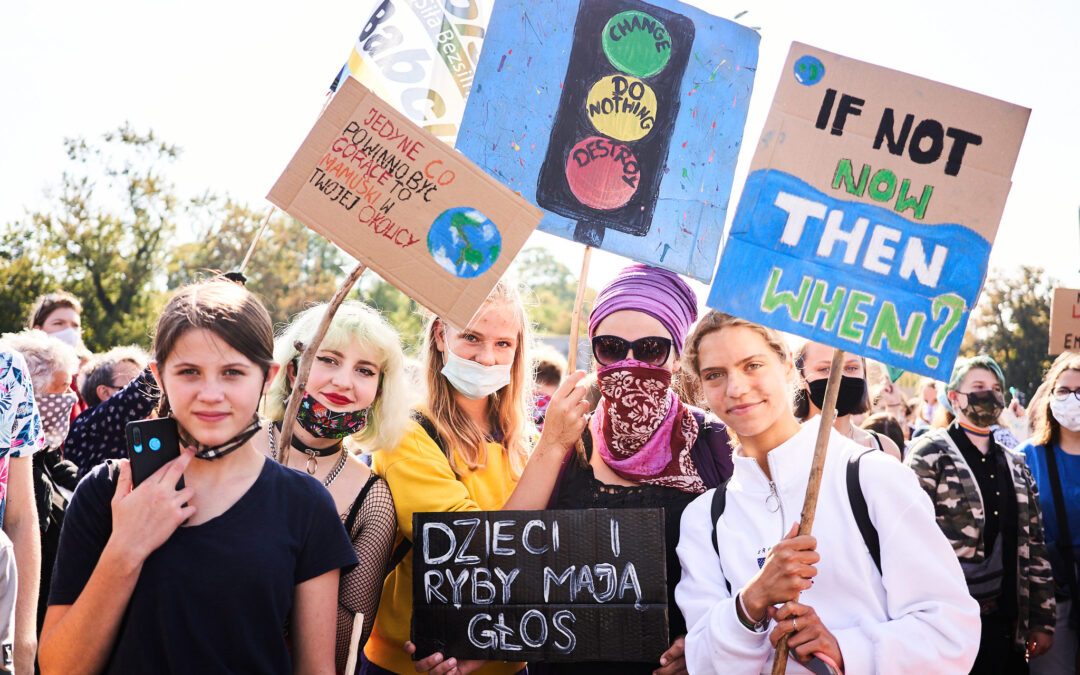Szymon Hołownia, the leader of one of Poland’s opposition parties, has called for the voting age to be lowered from 18 to 16. He argues that young Poles have shown themselves politically active and aware on issues such as climate change, and that 16-year-olds “are more mature than many of today’s 40- or 70-year-olds”.
“I promise to do everything to ensure that 16-year-olds can vote and decide their future,” wrote Hołownia, leader of the centrist Poland 2050 (Polska 2050), on Saturday.
“Defending the climate, demanding #czarnekout [the removal of education minister Przemysław Czarnek], they have shown that they are often much more aware than people who have the right to vote,” he added.
Obiecuję zrobić wszystko, by 16-latkowie mogli głosować i decydować o swojej przyszłości.
Broniąc klimatu, domagając się #czarnekout pokazali, że są nierzadko dużo bardziej świadomi niż osoby mające prawo głosu. pic.twitter.com/AEYxX6nNf8
— Szymon Hołownia (@szymon_holownia) April 22, 2023
Earlier that day, Hołownia had appeared at the Europe 2050 Youth Summit in Wrocław, an event organised by his party and Renew Europe, a liberal political group from the European Parliament, where he spoke on matters such as renewable energy and the need for a European army as part of NATO.
He also emphasised the important role that young people play in bringing about political and social change. “To save the world today, you don’t need a superhero, but you, a whole generation of heroes,” said Hołownia.
The proposal to allow 16-year-olds to vote is not a new addition to the agenda of Poland 2050, a movement that was formed after Hołownia – a journalist and TV presenter – entered politics in 2020 to contest the presidential elections, where he finished third.
At his party’s first national congress in 2021, Hołownia declared that, “to make elections truly universal, once PiS [the ruling Law and Justice Party] is removed from power, we will make it possible for people aged 16 and over to vote”.
A political party has launched Poland’s first app that members can use to vote on policy.
Its leader, Szymon Hołownia, calls the app a “groundbreaking” way to "build democracy". But some dismissed it as a gimmick while users reported technical problems https://t.co/GJ1iSLIHkR
— Notes from Poland 🇵🇱 (@notesfrompoland) September 6, 2021
Poland’s voting age of 18 is enshrined in the constitution, so changing it would require the support of at least two thirds of the members of the Sejm, the lower house of parliament, as well as a simple majority in the upper-house Senate.
The opposition are hoping to come to power by forming a coalition government after this autumn’s elections, which would include Poland 2050, who are currently polling around 7%. However, it would be very unlikely to command a two-thirds majority in the Sejm.
Hołownia claims that it would be possible to let 16- and 17-year-olds vote in local elections even before changing the constitution. However, article 62 of the constitution states that the voting age of 18 applies to electing local government officials as well as members of the national parliament and the president.
Hołownia’s proposal has received some criticism. Łukasz Warzecha, a columnist for right-wing weekly Do Rzeczy, described giving the right to vote to “people in the process of puberty, with little life experience, in the midst of a hormonal storm, with no knowledge of the world” as “one of the stupidest election demands”.
Prawa wyborcze dla 16-latków. @lkwarzecha: Jeden z najgłupszych postulatówhttps://t.co/Cv0jJXghn4
— DoRzeczy (@DoRzeczy_pl) April 23, 2023
A poll last month by Ipsos for OKO.press and TOK FM showed that, while Poland 2050 had only 6% support among the electorate as a whole, its figures were higher among young Poles: 18% among women aged 18-39 though only 5% among men in that age group – an average of 11.5%.
Among young men, by far the most popular party, with 37% support, was the far-right Confederation (Konfederacja), whose young new leader, Sławomir Mentzen, is Poland’s most-followed politician on TikTok.
Among young women, Civic Coalition (KO), the largest opposition party, has the most support (29%), followed by The Left (Lewica) on 20%. Both parties have pledged to remove the recently introduced near-total ban on abortion, which is unpopular among the public, and in particular young women.
Left-wing views among young Poles have reached their highest ever level in regular polling conducted since the fall of communism in 1989.
For the first time, left-wing views are stronger among the young than both right-wing and centrist ones https://t.co/bn95iYTOIe
— Notes from Poland 🇵🇱 (@notesfrompoland) February 8, 2021
Main image credit: Greenpeace Polska/Flickr (under CC BY-ND 2.0)

Anna Hackett is an assistant editor at Notes from Poland. She is a recent graduate of European Studies from Trinity College Dublin and has had previous journalistic experience with the Irish Independent News & Media group.




















